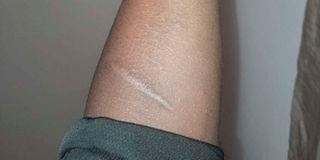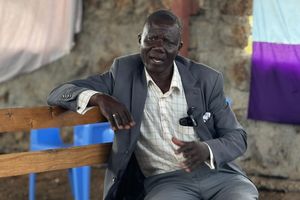Silent epidemic: Emmanuel’s story of surviving suicide and helping others

Emmanuel Brian Mbuthia, mental health and Psychosocial Disability Inclusion Advocate
What you need to know:
- To the outside world, Emmanuel is a perfect picture of positivity —his infectious enthusiasm lit up when we spoke and his energy was contagious.
- But beneath this exterior, he carries the weight of deep emotional scars- trauma from childhood that has stalked him into adulthood.
There is one day that Emmanuel Mbuthia always goes back to—a day that began like any other but ended with a decision that would change his life and the lives of many others.
That morning in 2016, he sat on the edge of his bed, phone in hand, staring at a blank WhatsApp screen, his thumb hovering over the keyboard. For years, he had carried within him, a deep sense of frustration, an overwhelming sense of loneliness, and on that day, he longed for a community.
For countless days, Emmanuel then aged 22 years old had used his Facebook platform as an escape, a journal, the one place where he could empty his thoughts.
Late at night, when the weight of his mental health struggles felt too heavy to bear, he would turn to social media and share fragments of his story --the loneliness, the trauma, and the moments when life felt too much. With every post, someone would reach out to him with their stories of struggles.
"I realised that there were many people who were dealing with childhood trauma, depression and suicidal thoughts. What if there was a place where they could talk to one another, lean on one another and feel less alone?" I wondered.
It was here that the WhatsApp group was formed, becoming a lifeline for many individuals. Over time, the online group has transformed into a community-based organisation, Stronger Project which is a community of survivors, fighters and supporters.
To the outside world, Emmanuel is a perfect picture of positivity —his infectious enthusiasm lit up when we spoke and his energy was contagious. But beneath this exterior, he carries the weight of deep emotional scars- trauma from childhood that has stalked him into adulthood.
"We could start this conversation here," he says, stretching his left hand. It bears a big scar, one that is more than just a mark on his skin. On some days, it is a symbol of the darkest moments in his life and on other days, it is also a sign of survival, proof that even in the deepest despair, he held on.
When strangers reach out to him with their struggles, he speaks of survival and the power to tell stories that saw him embark on a project writing about mental health issues and sharing the magazine online.
"It has been a journey and I have had to work on myself with the support of my family, friends and professionals. But, there are moments when I think about my childhood and I can barely face the next morning," he says. Then, continues, "When I was seven years old, I was sexually assaulted on two different occasions by two of our domestic workers who worked at our home at different times."
At the time, Emmanuel was too young to fully comprehend what had happened, let alone speak about it. He could not even tell his parents since they were very strict.
He buried the memories deep within, thinking that silence would shield him from the pain but the wounds from those experiences festered, and as he grew older, the trauma began to manifest in ways he could no longer control.
In his teenage years, Emmanuel started self-harming, using physical pain to numb the emotional agony that never seemed to fade. The trauma of his past haunted him relentlessly, and soon, his internal struggle became too much to bear.

Emmanuel Brian Mbuthia's photo of the scars from his self-harm.
He began to contemplate taking his own life as a way to escape the unbearable weight of his emotions. On many occasions, Emmanuel attempted suicide, feeling that death was the only way out of the darkness that consumed him.
Emmanuel shared that his weakest point came during his final year of primary school, after a public humiliation that would scar him for years to come. "I was humiliated in front of the entire class for failing my exams.
All the teachers beat me with my pants down," he recalled, his voice steady yet filled with emotion. "That was the first time I harmed myself."
When he joined secondary school, the situation was not any better. He struggled to fit in as he didn’t feel as confident as the rest of the students and to add salt to injury, he experienced a lot of bullying from his peers.
Back at home, things were not any better. His parents were struggling financially and he would occasionally find himself being sent home for school fees, or being left behind as his peers went for school-related trips as his parents couldn’t afford them.
Struggling with self-esteem amid everything, his performance deteriorated, he lost weight since he was barely eating, suicidal thoughts started to creep in, and he got triggered to self-harm again.
Emmanuel recounts how he used to do it without anyone else noticing. Things got out of hand and he started drinking alcohol in school which led to his suspension.
His father, who is a pastor, was furious to hear about the suspension and gave him a proper beating. Emmanuel was set to return to school after a few days but before going back, his father noticed that something was amiss with him and inquired to know what the matter was, but he couldn’t gather the courage to tell his father.
After Emmanuel returned to school, his father requested the school counsellor, to keep a close watch on him.
The counsellor made a point of regularly checking in on Emmanuel, and over time, he began to open up about his struggles, including the trauma of being sexually assaulted during his childhood.
Despite these counselling sessions, Emmanuel continued to inflict cuts on his arms. His situation came to light when a concerned classmate reported to the teachers that he might be self-harming, and some of his wounds appeared to be infected.
When confronted, he admitted that he was frustrated and desperate to end it all.
This revelation underscored the severity of his emotional pain and the urgent need for more comprehensive support and intervention. He was once again suspended.
Emmanuel’s father struggled to understand his son's behaviour, initially attributing it to spiritual warfare, given his background as a pastor. This led him to engage in fervent prayer for Emmanuel.
In search of a fresh start, Emmanuel requested to transfer to a different school, hoping a new environment would bring positive change.
Initially, the move seemed beneficial. Emmanuel’s academic performance improved significantly, but he soon faced a relapse and resumed self-harming. Unfortunately, the support he received at his new school was minimal.
Instead, he was subjected to harsh accusations, including being labelled as part of a cult and being forced to explain that his scars were not tattoos but remnants of his self-harm.
In a particularly humiliating episode, he was compelled to display his scars to other students during a school parade. “It was so humiliating, Grace,” he recounts, his voice trembling with the memory. Despite these setbacks, Emmanuel persevered and completed his secondary school education.
Struggling with anxiety, depression, and a low concentration span, he didn’t perform as well as he had hoped in the final exams, which made him feel that he had disappointed his parents. To his surprise, his family responded with understanding and support, helping him view life more positively. He found temporary employment while waiting to join college, and for a while, life seemed to gain meaning.
In 2014, the suicidal thoughts returned, stronger than ever. Emmanuel felt certain he would follow through. He cut his arm deeply, severing a blood vessel and requiring urgent medical attention. In his distraught state, he also harmed his cat, though he has no memory of it.
When he regained consciousness and realised the severity of his actions, it became a turning point for him. The realisation that something had to change was a catalyst for seeking further help and starting his journey toward recovery.
He reached out to a friend, whom he opened up to, and would later introduce him to a psychologist. The psychologist suggested that Emmanuel invite his father to one of their sessions to help him better understand what his son was going through. His father agreed to the request.
Emmanuel was diagnosed with Bipolar disorder and major depressive disorder and was put on medication. Bipolar disorder is a mood disorder characterised by extreme shifts in mood, energy, activity levels, and the ability to carry out daily tasks. These mood shifts range between manic (or hypomanic) and depressive episodes. Major Depressive Disorder, also a mood disorder is characterised by persistent feelings of sadness, hopelessness, and a lack of interest or pleasure in daily activities
The diagnosis didn’t make the journey any easier. Managing his mental health was a constant battle, and even with treatment, he found himself struggling to stay afloat.
The 30-year-old notes that his struggle with his mental health, self-harm and suicidal thoughts has brought his family closer than ever before. “One of the things that has kept me going is having genuine friends, people I can talk to,” he mentions, adding that seeing his parents come around and apologize for projecting their frustrations on him and his sister was a huge relief for him. With the great support system from his family and close friends, I managed to keep soaring above and keeping a positive mind,” reveals Emmanuel.
He realised that his story could have a purpose beyond his survival. He knew that he wasn’t the only one who had been through such traumatic experiences, and he wanted to ensure that others didn’t have to face the same battles alone.
In 2017, Emmanuel channelled his pain and his recovery into something positive: he founded the organisation dedicated to supporting survivors of sexual assault, those struggling with mental health issues, and anyone who has found themselves on the brink of despair.
The organisation provides counselling services, peer support groups, and educational workshops focused on trauma recovery, mental health awareness, and suicide prevention. Emmanuel’s mission is to create a safe space for others to share their stories, seek help, and find hope.
“Every counselling session, every support group, and every conversation is a reminder of why I chose to keep fighting. By helping others navigate their pain, I have found healing. This organisation is a lifeline for many, offering the kind of support I wish I had when I was going through a lot,” Emmanuel told Healthy Nation.
Today, Emmanuel’s life looks very different from the days when he was caught in a cycle of self-harm and suicidal thoughts. He has become a symbol of resilience and recovery. He speaks openly about his past, sharing his story to show others that they are not alone and that healing is possible.
Through his advocacy, Emmanuel is breaking down the stigma surrounding sexual assault and mental illness in Kenya, opening up vital conversations that have been long overdue.
Emmanuel, like many other children, is not only a victim of predatory men and women but also of a society that fails to protect its most vulnerable. This cruelty leaves a generation of young girls and boys carrying deep emotional scars, forced to nurse their trauma well into adulthood.
According to the Kenya Information Health Survey data, sexual violence cases have been on the rise in various counties for the last four years, with Kakamega and Mombasa counties reporting the majority of defilement cases.
Kakamega, for instance, has reported 1,065 sexual violence survivors this year alone, and 75 per cent of them are defilement cases.
In 2020, the county recorded 860 rape survivors, and dropped to 720 in 2021. In 2022, the number almost doubled, with the county recording 1,206 cases.
According to the World Health Organization (WHO), suicides happen impulsively in moments of crisis with a breakdown in the ability to deal with life stresses, such as financial problems, relationship breakups or chronic pain and illness.
Global estimates indicate that there are more than 700,000 suicides annually. According to WHO, “more than twice as many males die due to suicide as females (12.6 per 100,000 for males against 5.4 for females).
Data trends in Kenya show that suicide rates among men have consistently been three to four times that of women in the last two decades. In 2019, for instance, 9.1 per cent of men in every 100,000 died from suicide compared to 3.2 per cent of women, according to World Bank statistics.
The World Bank data puts suicide mortality rates in Kenya at 6.1 people in every 100,000, with men being in the highest risk category, with 9.1 men in every 100,000 affected.
In 2020, according to data from the police, almost 500 people were reported to have killed themselves. The youngest person to take their life was nine years old; the oldest was 76 years.
A 2021 study titled Masculinities, emotions and Men's Suicide by Jo River and Michael Flood established that the high rates of male suicide could be linked to the “active pursuit of hegemonic masculinity via emotional restriction”.
Based on 18 Australian men who had attempted suicide, the study noted that the participants learned in childhood that “expressing emotions such as sadness reduced masculine standing, whereas expressing anger through acts of violence could enhance masculine status”.
The men thus became vulnerable to suicide if they felt that their masculinity was under siege. “Many participants indicated that suicide presented a means of ending painful emotions”.
This study registered the paradox of suicide as “an alternative means of demonstrating masculinity” by casting such men as heroes who rejected suffering by paying the ultimate price. But suicide can also be seen as a sign of cowardice that contradicts conventional masculinity.
As the world commemorates World Suicide Prevention Day next week on September 10, Nancy Kabiru, a counselling psychologist, says that it’s important to give suicidal people an audience and listen to what they have to say, “one of the reasons why some people feel that they cannot forgive is because they’ve not felt like their story has been heard.”
“We need to reevaluate how we approach mental health, ensuring that no one feels isolated, unheard or without hope,” she says.
Ms Kabiru goes further to explain that one’s environment and how well one was empowered in their formative years, ages 0 to seven, plays a major role in building one’s confidence in resolving issues. “If someone was made to feel incapable of doing anything in your formative years, there’s the risk of giving up easily when life-demanding challenges kick in,” she says.
According to Ms Kabiru, some of the signs to look out for in someone who is struggling with suicidal thoughts include any drastic changes in one’s day-to-day operations, indulging in reckless behaviour, withdrawal from people, overindulging in substance consumption like alcohol, being negative about anything being discussed and throwing statement that hints that they might be suicidal.
Should one suspect that someone might be suicidal, she recommends having them assessed by a psychiatrist, psychologist or a clinical psychologist stating that there is an assessment particularly for risk of suicidality.
“In instances where the person does not want to voluntarily get for the assessment, it’s okay to force them. “Assessment for suicidality should not be left for voluntary action,” Nancy asserts.
For Emmanuel what once seemed like an endless struggle has now become a source of inspiration for others, proving that even in the darkest of times, there is always a path forward.
“Through Stronger Project, I am not only saving lives but also changing them for the better,” Emmanuel offers.





